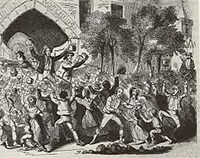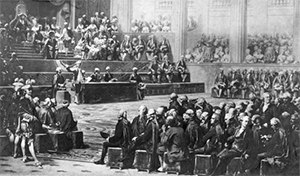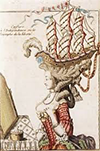The French Revolution
Part 4: Debts, Reforms, and Political Action One proposal by Turgot that seriously angered much of the upper classes was the abolition of the corvée, a system of compulsory unpaid labor that had been a mainstay of feudal Europe and, in fact, dated to the late Roman Empire. In medieval times, the lord of a manor could dictate the terms of such labor. This system in France included the royal directive of peasants, including work on public roads. 
Turgot had shown a firm hand in suppressing a number of bread riots, after a terrible harvest in 1774 had resulted in a rise in the price of bread and a consequent increase in the level of social distress. He had come under fire earlier for attempts to establish free trade for grain, which the nobility and, indeed, the rest of the royal council opposed. In 1776, Turgot issued the Six Edicts, of which the suspension of the corvée was one. Four of the other edicts made few waves with his opponents. The sixth did away with two prime privileges enjoyed by the guilds. Turgot had as a very ambitious goal the elimination of privilege altogether and the institution of taxation across all three of France's Estates. Such an idea would have been very popular with peasants certainly but also with the philosophes and other champions of equality. With the rich and powerful, however, it was a bridge too far. Parlement refused to countenance such a proposal. That was enough to convince the king to remove Turgot as chief minister of finance. 
Taking over that post was the Swiss banker Jacques Necker (left), in June 1777. He, too, implemented reforms, in order to restore some semblance of normality to the government's increasingly chaotic spending. What Turgot and then Necker discovered was that the young king and his wife were profligate spenders. The king liked to ride horses and to live in palaces, and he spent a lot of money on both; the queen was very fond of lavish clothes and parties and extravagant furnishings and spent a lot money on all three. The country was still facing an enormous amount of war debt from the recent conflicts and was at the moment helping finance another one, in North America. Necker tried to stem the tide by turning to loans, municipal bonds, and indirect taxes, rather than instituting another new tax or raising existing ones.
Almost from the beginning, a certain element of French society targeted the queen with slander and libel, speaking untruths and half-truths and writing outright lies about the foreign queen and her high-spending ways. This gave rise to her being dubbed "Madame Deficit" and much worse. The more in debt France became–for a variety of reasons that dated all the way back to the treasury-sapping wars of Louis XIV–the more many of the queen's subjects blamed her for the economic struggles that she, as the monarch's wife, was technically overseeing. The king, after finding little success with Necker, turned next to Étienne-Charles de Loménie de Brienne to run the country's finances. One of his primary duties was to convince the parlement to register the king's new laws. By that time, 1787, the king had convened the Assembly of Notables, which had flatly rejected the king's proposals. Louis XVI lashed out, arresting two of the leaders of the opposition, exiling the other members of parlement to Troyes, and then dissolving the body entirely, replacing it with a plenary court. In desperation, the king summoned the Estates-General, which had been dormant since 1614. 
Tensions between rich and poor that had been bubbling up for years boiled over at this and other real or perceived slights, and the Third Estate members of the Estates-General demanded double representation. This was significant because the membership in the assembly was not done according to population. The members of the First and Second Estates combined was about 50,000; the Third Estate numbered 25 million. In the 1789 Estates-General, 296 deputies represented the First Estate, 282 represented the Second Estate, and 610 represented the Third Estate. And yet, representation in the Estates-General was equal for each Estate when it came to voting on something, which was the way in which Estates-General worked. So in fact, if the First Estate and Second Estate agreed on something (which they usually did), then they could force its approval, even if the Third Estate did not agree. The government did not grant double representation for the Third Estate. In response, the Third Estate on June 17, 1789 declared itself the National Assembly. The king responded by shutting the doors of the place where the National Assembly had been meeting, and the members of the assembly adjourned to a nearby tennis court, on which they sword the Tennis Court Oath, which bound them to one another and to the common cause of securing for their country a constitution. By this time, a large number of clergy and nobility had found enough in the Third Estate's actions to sign on. On July 9, the National Assembly became the National Constituent Assembly, which officially did away with the Estates-General. Next page > A Prison Stormed, a New Declaration > Page 1, 2, 3, 4, 5, 6, 7, 8, 9 |
|
Social Studies for Kids
copyright 2002–2026
David White



 Complicating matters also at this time was the free-spending proclivities of the queen, Marie Antoinette. She had exorbitant taste and raided the royal treasury to buy expensive clothes and jewelry and to throw elaborate parties. One thing she particularly liked was to have her hair done in extravagant and showy ways. Her hair at times rose a few feet off her head. On one occasion, to mark a French naval victory, she had her hairdo include a large model of a French warship. Her extravagant spending did not go unnoticed, especially by those who could not afford the basics. A series or poor harvests in the 1780s resulted in a rise in the price of bread, which meant that some people had to go without. And yet, Marie, especially, but also others of the royal family and certainly some nobles carried on with their profligate spending. At the same time, however, the queen was known to have given large amounts of food to people in need and even sold off a number of expensive things in her possession in order to buy grain for the poor.
Complicating matters also at this time was the free-spending proclivities of the queen, Marie Antoinette. She had exorbitant taste and raided the royal treasury to buy expensive clothes and jewelry and to throw elaborate parties. One thing she particularly liked was to have her hair done in extravagant and showy ways. Her hair at times rose a few feet off her head. On one occasion, to mark a French naval victory, she had her hairdo include a large model of a French warship. Her extravagant spending did not go unnoticed, especially by those who could not afford the basics. A series or poor harvests in the 1780s resulted in a rise in the price of bread, which meant that some people had to go without. And yet, Marie, especially, but also others of the royal family and certainly some nobles carried on with their profligate spending. At the same time, however, the queen was known to have given large amounts of food to people in need and even sold off a number of expensive things in her possession in order to buy grain for the poor.
